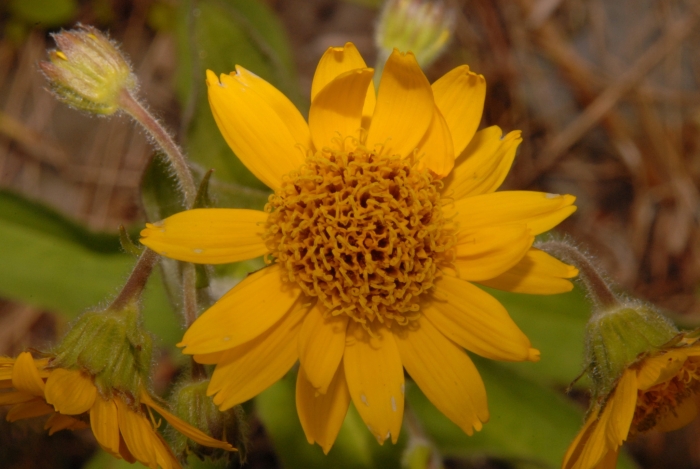Chamisso Arnica
(Arnica chamissonis)
Chamisso Arnica (Arnica chamissonis)
/
/

© Brian Finzel
CC BY-SA 4.0
Image By:
© Brian Finzel
Recorded By:
Copyright:
CC BY-SA 4.0
Copyright Notice:
Photo by: © Brian Finzel | License Type: CC BY-SA 4.0 | License URL: http://creativecommons.org/licenses/by-sa/4.0/ | Uploader: finzelflowers | Publisher: iNaturalist |

























Estimated Native Range
Summary
Arnica chamissonis, commonly known as Chamisso arnica, is a perennial herb native to a variety of habitats in western North America, including moist meadows, grassy slopes, and the understory of coniferous forests from sea level to alpine zones. It is particularly prevalent in montane to subalpine regions, extending from Alaska through most of Canada and into the western United States. Chamisso arnica typically reaches up to 30 inches in height and features yellow, daisy-like flowers with a prominent central disk and ray florets, blooming from late spring to early fall. The foliage is bright green, with leaves arranged in pairs along the stems.
Chamisso arnica is valued for its showy yellow flowers and is used in wildflower gardens, naturalized areas, and restoration projects. It is also appreciated for its medicinal properties, as it contains the toxin helenalin, which is used in homeopathic preparations for its anti-inflammatory effects. In cultivation, it prefers full sun to partial shade and requires well-drained soils with consistent moisture. While it is not typically grown in traditional garden settings, its ease of maintenance and tolerance of cold climates make it a suitable choice for naturalistic plantings. Care should be taken when handling this plant, as helenalin can be irritating to the skin and harmful if ingested.CC BY-SA 4.0
Chamisso arnica is valued for its showy yellow flowers and is used in wildflower gardens, naturalized areas, and restoration projects. It is also appreciated for its medicinal properties, as it contains the toxin helenalin, which is used in homeopathic preparations for its anti-inflammatory effects. In cultivation, it prefers full sun to partial shade and requires well-drained soils with consistent moisture. While it is not typically grown in traditional garden settings, its ease of maintenance and tolerance of cold climates make it a suitable choice for naturalistic plantings. Care should be taken when handling this plant, as helenalin can be irritating to the skin and harmful if ingested.CC BY-SA 4.0
Plant Description
- Plant Type: Herb
- Height: 1-2 feet
- Width: 1-2 feet
- Growth Rate: Moderate
- Flower Color: Yellow
- Flowering Season: Spring, Summer, Fall
- Leaf Retention: Deciduous
Growth Requirements
- Sun: Full Sun, Part Shade
- Water: High
- Drainage: Fast, Medium
Common Uses
Bee Garden, Butterfly Garden
Natural Habitat
Moist meadows, grassy slopes, and the understory of coniferous forests from sea level to alpine zones
Other Names
Common Names: Chamisso Arnica, Yellow Arnica, Arnica De Cham., Leafy Arnica, Meadow Arnica
Scientific Names: , Arnica chamissonis, Arnica bernardina, Arnica bruceae, Arnica cana, Arnica celsa, Arnica chamissonis f. chamissonis, Arnica chamissonis f. incana, Arnica chamissonis subsp. chamissonis, Arnica chamissonis subsp. foliosa
GBIF Accepted Name: